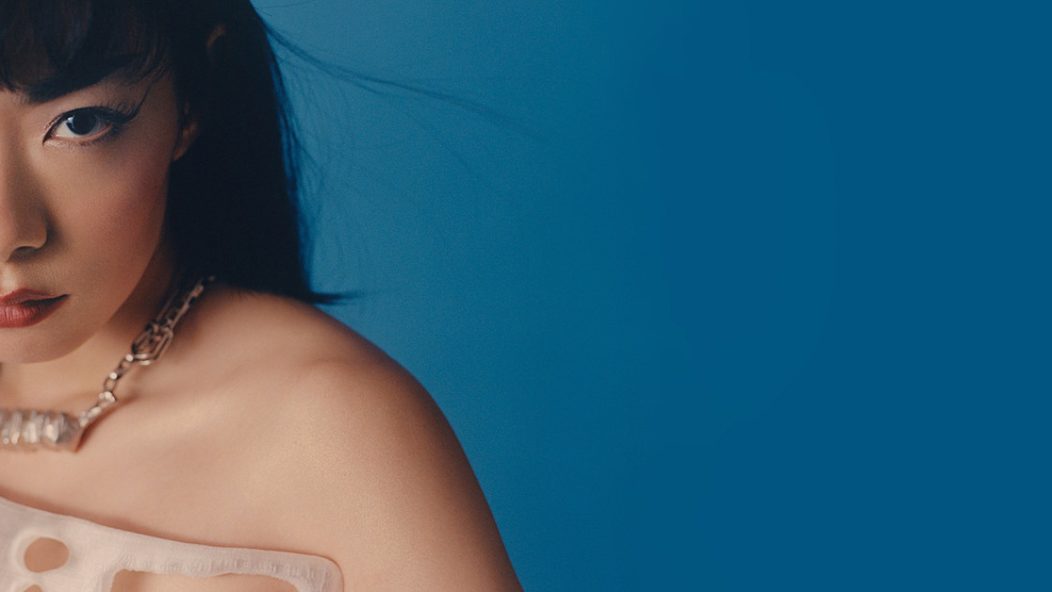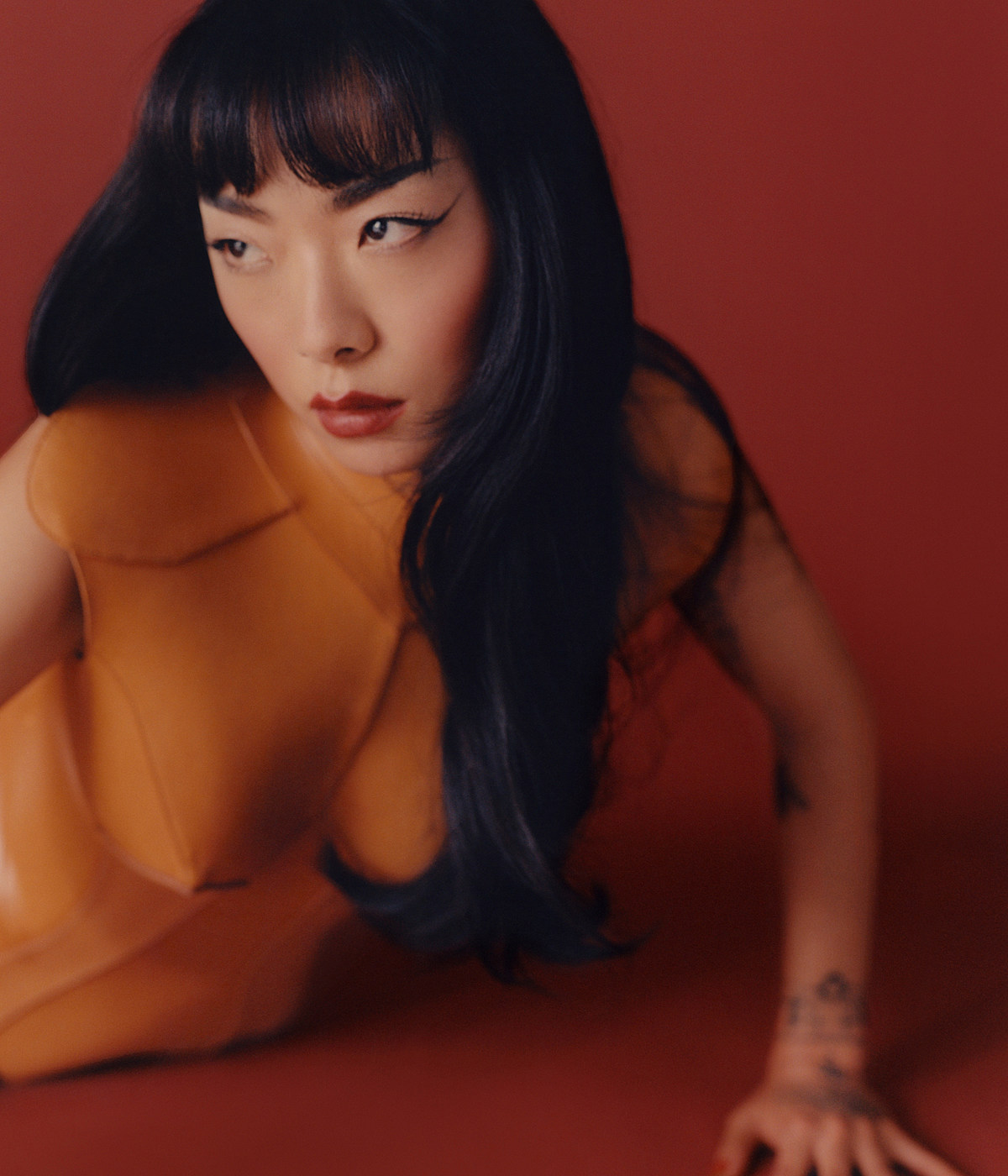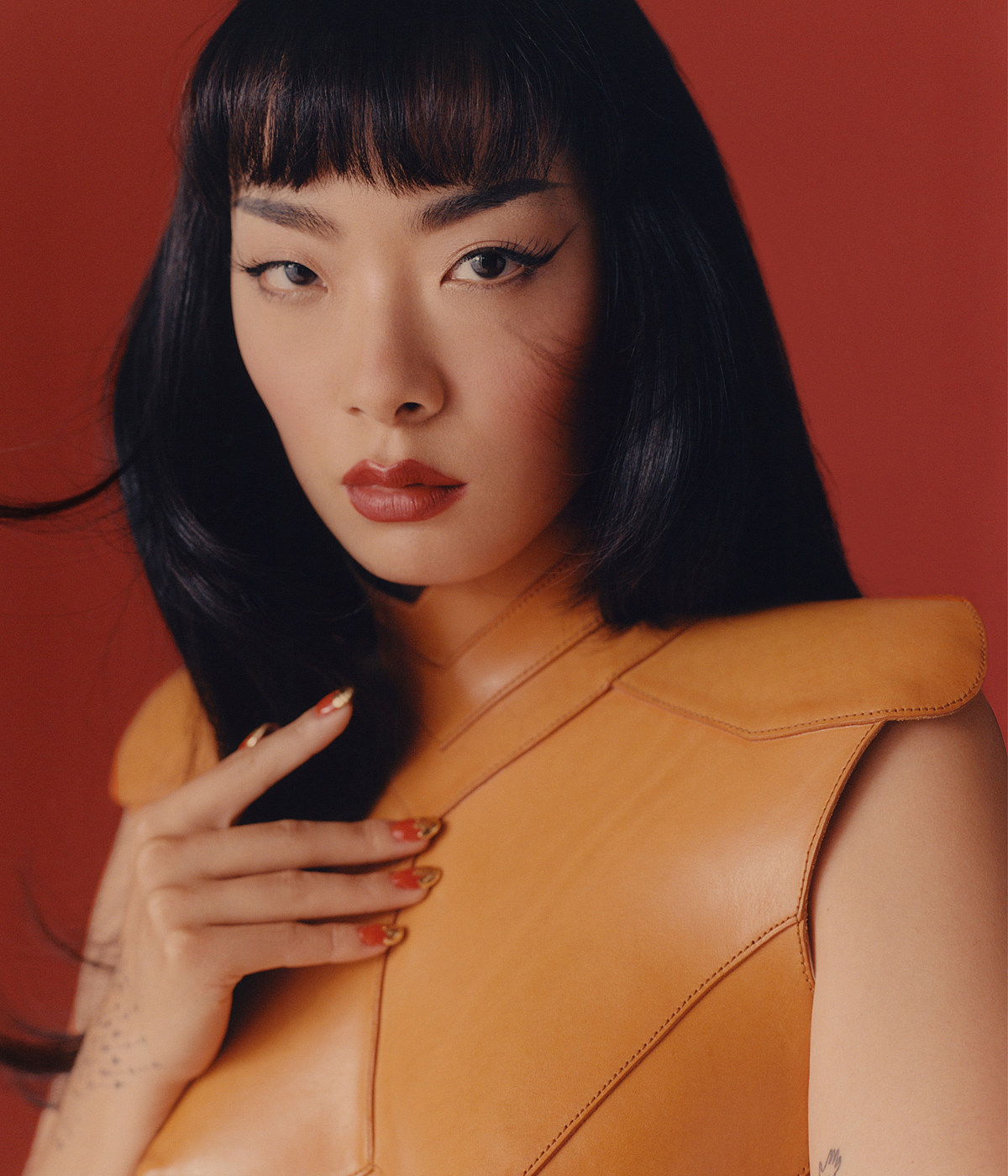
Rina Sawayama on her debut album SAWAYAMA and rise to stardom in 2020
Everything is intentional for Rina Sawayama. She walks into studio sessions with an already established vision of the finished product. If she wants her next single to emulate N.E.R.D., she’ll leave that same session with the strum-filled, capitalism-mocking anthem “XS.” If she’s looking for something reminiscent of an anime intro or a theme from a ’00s teen sitcom, she’ll wind up with the high-maintenance, saxophone-wailing “Paradisin’,” which alone is worthy of a Disney Channel original series.
And if the Japanese-born British nü-metal-fusing pop maven ever didn’t know exactly what she wanted from her music or was without any of her endless reference points—including the occasional nod to Amy Lee’s vocal delivery—she’d feel like she’d be wasting her producers’ time. To the 30-year-old, a producer’s time is critical, and sometimes, it can lead to something spectacular; in her case, her April 2020 debut album, SAWAYAMA.
Sawayama’s debut was a music critic’s dream release, earning her much-deserved recognition after her 2017 EP RINA and several years of under-the-radar SoundCloud drops. At this point, she believes she’s found her sound as she prepares for whatever mystery lies ahead in the post-SAWAYAMA era. During a time when the parameters of pop stardom are ever-changing, by her own definition, Sawayama has become the pop star people want. And, even more so, she’s the pop star people deserve.

[Photo By Greg Linjiajie]
SAWAYAMA, for so many, has been the record to help them through this past year. Are you proud to take a step back, knowing that you’ve soundtracked this period for so many and still continue to?
I’m so proud. It’s surreal. First of all, the whole point of that record for me was I just wanted to do what I wanted to do, if that makes sense. I really wasn’t thinking about commercial success. I was 29 when I released the record. And so I really was like, “This is my one debut record. I’m going to do what I like.” I thought it was quite weird, the record. I thought it was too weird for the general public to like. I was so in the midst of it, all the way through last year. And then I think the one time that it really, really hit home was when I got asked to do Jimmy Fallon. And that’s the moment where I was like, “This is so mental.” And then it went into end-of-the-year lists. It was just insane. Career-wise, I’ve had an incredible 2020. So I’m super grateful for that. Because I know that’s not been the case for most people.
I was going to ask what you’d point to as the defining moment of this release era, but hearing what you said about that Fallon performance reminded me that music journalism Twitter was going off that day, the whole timeline. What was that performance like for you?
It’s such a pipe dream. Especially because I live in the U.K. And we don’t really have that culture of late-night TV here. You’ve got the big names in America. And I was like, “I’m sure I have to be at this point of my career to get asked to do that.” It was incredibly surprising. It being during lockdown, and [with me] not being able to travel, it worked in our favor because we could do whatever we wanted. I just followed my own instinct. I wanted it to be, not punk, just in terms of the aesthetic but a bit more grunge-y. And I’ve always thought of “XS” and so many different versions [of it] in my head. So I’m really glad that I got to do one of them. And I can’t wait to hopefully do more.
You mentioned a while back that 2020 was the year for the pop girls. You were certainly a driving force in that. Do you feel like this has been a movement of sorts?
I’m so surrounded by pop all the time. I only listen to pop. I do think that when the biggest pop girls release an album, that’s when I think it is a very defining year. Lady Gaga released her record, and God knows I’ve been waiting for that record for such a long period because I’ve known about it through BloodPop. I was so excited for that to come out and then Dua Lipa as well. I just love being able to listen to such amazing pop writing, and I’m so glad that there was new music last year. Otherwise, I think everyone would have been so bored by now.
In the past, you’ve spoken about the importance of representation in the industry. Even being 29 years old when you released SAWAYAMA and growing up seeing someone like Britney Spears break through as a teen. Do you see things shifting?
I think so. There’ll always be amazing prodigy people. You look at Billie Eilish, people who are so unwavering in what they want to do. And they have a group of people—whether it’s a team around them or family—who [help them] make it happen from such a young age. That’s amazing to see. And it looks like she’s doing really well. Not just in her career, but mental health-wise. She looks like she’s coping really well with it. I don’t think there’s going to be another Britney moment where there are horrible people—not from the press, it’s moved to social media. But I do think there’s a shift and an intolerance toward that manufacturing of people or coaxing people into doing a certain thing or overworking [them]. I love seeing that the women in the pop industry really look like they own their image and they own their voice. And they are in charge. And I think the rise of YouTube, and just social media, has helped people understand and relate to some of the problems that people encounter. I think that the kind of pop star that people want has really changed since I was growing up.
This album is as much of a reflection of your family and your life as it is the album to immediately look at when clubbing makes its triumphant return. Where do you find that balance of keeping things personal and making things fun when creating a body of work?
Oh, that’s always my eternal struggle. It always has to do with my collaborators. I really do think Clarence Clarity, who exec-produced the record, brings such an air of fun with him. And he doesn’t take things seriously at all. He is always on board with my crazy ideas, so I’ll be like, “I want ‘Paradisin’’ to sound like a theme tune to an anime or a teen TV show,” and he’s totally on board. And also, I have writers with me who just don’t wince at stuff, which is really cool. Especially for that record, I had a lot of things to work out within myself, [so] the lyrics came quite naturally. I went at it like a project. And I was like, “This is what I want to write about. This is what I want to sound like.” So I had a really clear vision in that way. I always have this anxiety every time I go into a new session that I can’t write another song again. And then eight hours later, I have a new song. I always have such fear of not being able to write anything. And it’s so funny, like when I talk to my co-writers, I’m always like, “Oh, I can’t just write a love song.” And they’re like, “Oh, I can only write love songs.” It’s a good balance. I get to work with people who’re really like yin and yang for me.
“XS” had you hammering out that N.E.R.D. sound with the guitars. Do you always intentionally go into the studio and say, “Today I’ve been listening to a lot of Neptunes and X, Y or Z,” or do you find things just happening off the cuff?
I like to go in with intention every single session. And this is why I don’t do that many sessions. I like to do my homework. And I really like to go in with a mission or at least loads of ideas because the reality is, songwriters don’t get paid, and producers don’t get paid to just sit there with you in the room. And so I’m trying to respect their time by coming with ideas. There is this preconception of artists just strolling in at 3 a.m. after the producers have been waiting for hours for them to show up. And I don’t know if that’s true, and I haven’t actually met anyone like that, but I’m always cognizant of the fact that the industry on that side, and the creation side, is all based on people getting percentages of the final product. And if there’s no good final product, then there’s no song. There’s no released single. I guess I come from that. Having spent quite a few years being freelance myself and working for myself and understanding how frustrating that must be for another person, I try not to muck about too much.
Looking at the contents of this record, it takes a wizard to lace nü metal in ’00s-inspired pop. Did you ever imagine yourself as the type of person to connect these two worlds that you grew up on?
I was completely lost really, sonically. In my head, I’m always confused and lost. The record and the songs on the record sound really finished and polished and sound good now, but up until like 85-90% [completion], it sounds crazy. Because it’s a mashup of so many different genres. And I take so long on that last 10-15%. I sit there in the studio with an engineer, take apart all the songs, put them back together. What I don’t want it to sound like is a pastiche or something that is just copying a genre. I want it to sound authentic. So that’s the bit I spend a lot of time on.
I’m convinced that, other than songs like “STFU!” where it’s really sitting in one genre, songs like “XS” are definitely quite a bit of a mess. “Dynasty” was a mess until literally the last 10% of the process where you just get to re-record stuff and clean it up. Because there are so many different things and so many different ideas wanting to burst out that you just need to put them in a cage and make sure that it all sounds good at the end of the day. And I took out so many elements that I think the producers on the record were quite fond of. To me, it just needed to flow and needed to be digestible because otherwise, it would have felt really cluttered. I started my career on SoundCloud. I didn’t blow up at all on SoundCloud or anything. I first uploaded my songs on SoundCloud. And I remember feeling like I just didn’t know what my sound was. I was writing a lot of R&B music, which is what I grew up listening to, but it just really didn’t fit with me. And it wasn’t until I met my collaborators that they really enabled me to lean into those references, like Evanescence, t.A.T.u. and Pussycat Dolls, that I was finally set free.
After that 10% grind, do you remember the first time you heard the record in full, completely mixed?
I felt like it sounded OK—just OK. At that point, I don’t know how many times I listened to the songs. So I just really couldn’t see the wood for the trees. I just had to trust other people when they said it was finished. My A&R, my managers, they were just like, “Rina, it sounds good now.” Thank God for vinyl pressings. Because if that wasn’t there, I think I would have carried on in 2021 really, just tinkering with it. But they were like, “We need deadlines for the vinyl pressings. Otherwise, you won’t meet your deadline. And otherwise, you can’t release your record in April.” I’m glad they were there to keep me sane.
It was only a couple of months after it came out, and the reviews had sunk in and the YouTube reviews I was watching as well, some of them. I finally felt that the record was pretty good. I think I was just satisfied. It’s one of those things that it’s like if you’re [writing] a dissertation or something, you just don’t even understand the sentences anymore. You’re just like, “I just need to get it in.” And then you’ll look back and you’re like, “Oh, actually, that wasn’t too bad.”

[Photo By Greg Linjiajie]
What’s your biggest source of inspiration musically at the moment?
I’m halfway through The Sopranos. It’s just amazing. The collaboration is what I look at. I’m just amazed at the power of collaboration. And it reminds me that it’s OK to not have to do things on my own. Because no great work was ever done on its own. I take comfort in that. I just watched It’s A Sin, which is amazing. I don’t know if it’s made its way across to the U.S. It’s about a group of queer people living in London during the AIDS crisis in the ’80s and ’90s. It’s got Olly Alexander in the lead role. I’ve written about my chosen family in the record, and that whole series really drove home this idea of tribes and families. And I guess it gives me ideas for broad concepts and stuff that exist in my life that I’m like, “Oh yeah, this is important. I should write about this.” I’ve been doing that for the last couple of months. And again, I’m getting quite bored. So I think tonight, I might play some Nintendo Switch because I haven’t played games in a while. So just trying to get my child brain going, you know?
With all this in mind, what’s your biggest goal for this year?
Just write as much music as I can and try to enjoy the quiet moments because, truthfully, there was no quiet moment last year. I think I did burn out a bit. But then, the burnout was quite like, “Who am I if I’m not touring?” and “Who am I if I’m not writing more music right now?” I think with everyone it’s just like trying to check in with yourself and be OK with being a bit still. It’s something that’s so not promoted in society, ever. So it’s really weird that now we’re forced to do that. But trying to take a bit of pleasure in doing that is something I’m working toward. I try not to make any plans.










